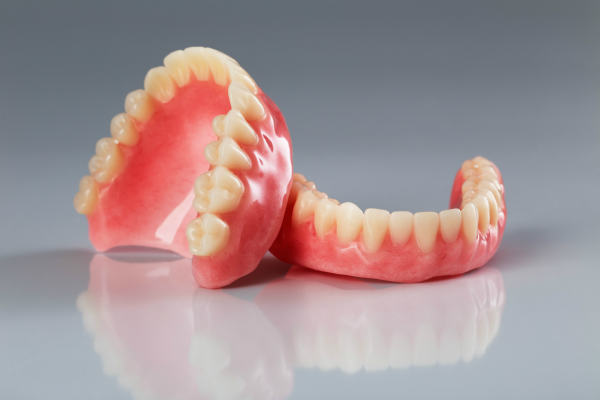Removable Denture
A denture is a removable replacement for missing teeth and surrounding tissues. Two types of dentures are available -- complete and partial dentures. Complete dentures are used when all the teeth are missing, while partial dentures are used when some natural teeth remain
Complete Dentures
Complete dentures can be either "conventional" or "immediate." Made after the teeth have been removed and the gum tissue has begun to heal, a conventional denture is ready for placement in the mouth about eight to 12 weeks after the teeth have been removed.
Unlike conventional dentures, immediate dentures are made in advance and can be positioned as soon as the teeth are removed. As a result, the wearer does not have to be without teeth during the healing period. However, bones and gums shrink over time, especially during the healing period following tooth removal. Therefore a disadvantage of immediate dentures compared with conventional dentures is that they require more adjustments to fit properly during the healing process and generally should only be considered a temporary solution until conventional dentures can be made.
Partial Dentures
A removable partial denture or bridge usually consists of replacement teeth attached to a pink or gum-colored plastic base, which is connected by metal framework that holds the denture in place in the mouth. Partial dentures are used when one or more natural teeth remain in the upper or lower jaw. A fixed (permanent) bridge replaces one or more teeth by placing crowns on the teeth on either side of the space and attaching artificial teeth to them. This "bridge" is then cemented into place. Not only does a partial denture fill in the spaces created by missing teeth, it prevents other teeth from changing position. A precision partial denture is removable and has internal attachments rather than clasps that attach to the adjacent crowns. This is a more natural-looking appliance.
>> What Do New Dentures Feel Like?
New dentures may feel a little odd or loose for a few weeks until the muscles of the cheeks and tongue learn to keep them in place and you get comfortable inserting and removing them. Also, it is not unusual for minor irritation or soreness to occur and for saliva flow to increase when you first start wearing dentures, but these problems will diminish as the mouth adjusts.
>> Will Eating With New Dentures Be Difficult?
Eating with new dentures will take a little practice and may be uncomfortable for some wearers for a few weeks. To get used to the new denture, start with soft foods cut into small pieces. Chew slowly using both sides of your mouth. As you get used to new dentures, add other foods until you return to a normal diet. Be cautious with hot or hard foods and sharp-edged bones or shells. And, avoid foods that are extremely sticky or hard. You may want to avoid chewing gum while you adjust to the denture. Also, don't use toothpicks while wearing dentures.







